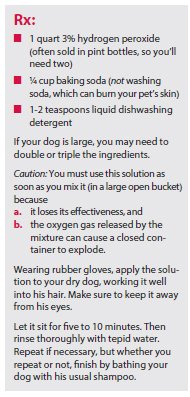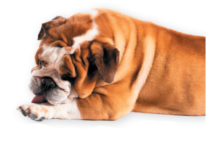Skunks live throughout much of the United States, which means many owners of dogs, particularly dogs who feel that all moving creatures are either prey or must be herded, have experienced the unpleasant, super-pungent and noxious odor that skunks leave behind when they spray in self-defense. Some have described the scent as a mix of rotten eggs and burning tires.
BIGSTOCK

It makes sense that the odor is so bad. A skunk’s scent glands, near his tail, are his most important piece of armor. He tends to use them at night; skunks are nocturnal, so that’s when they’re most apt to have a chance encounter with a dog who feels he must “handle” the situation.
It’s not that a skunk is looking for trouble. In fact, skunks are generally docile. It’s just that while they have good hearing and a good sense of smell, they do not see well. Thus, if threatened by another animal, the usually gentle skunk may first give nothing more than a warning with a foot stamp, a hiss, and a tail-raise. But if the skunk feels his warning is not being heeded, he’ll use his “weapon.” The encounter doesn’t even have to be “intimate.” A skunk can reach his mark from up to 15 feet away — and has expert aim.
The scent is awful, to be sure. Even just being near a dog who has been sprayed can cause your own eyes to sting a little and make it feel like the sulfur-based chemical has gone right down your throat.
But can skunk spray do more to your dog than just make him stink? Theoretically, if exposure is severe, the spray can interfere with the structure of a dog’s hemoglobin, thereby causing a type of anemia that results in lethargy, in addition to black feces and brown urine. And there has been at least one report of death in a case where the exposure was severe. But such effects are very, very rare. And it’s not even clear that the skunk spray was what caused the dog’s demise. There may have been other factors at work.
For those worried about rabies, they can rest assured that a skunk who is effectively able to spray a canine threat is showing signs of health. In addition, because skunks are nocturnal, if a skunking occurs at night or even around dawn, it’s highly unlikely that the skunk is rabid — although it’s never a bad idea to consult with your veterinarian after your dog has been hit with skunk spray.
Much more likely are effects that are short-lived and not ultimately damaging. For instance, a dog sprayed directly in the face might salivate more than usual and may also develop mouth ulcers, but those will heal with no permanent complications. Similarly, if a dog is sprayed in the eyes, compounds in the spray can cause tearing, ulcerations, and even temporary blindness in some cases, but nothing that won’t reverse itself. That said, if your dog’s eyes appear irritated or red after he has been sprayed, immediately flush them with cold water to help lessen the untoward effects.
The good news in all of this (if you can call it that) is that in the vast majority of cases, all you have to worry about is the stench — a stench that seems to have a way of wafting through the house and seeping into carpets and fabrics. Which makes the main concern getting rid of the odor.

The right way to expunge the stench
Chemical & Engineering News reports that over time, skunk odor sets and is harder to remove, so if your dog is sprayed, you want to treat the problem as soon as you get back to the house.
How? Everything from bathing with tomato juice to vinegar mixed with water to vanilla extract has been recommended — and continues to be advised all over the Internet. But the most effective skunk odor neutralizer consists of a combination of hydrogen peroxide, baking soda, and liquid dishwashing detergent (see box).
The result may not be perfect (and the de-skunking mixture may temporarily bleach your dog’s hair). But it’s going to be a lot better than it would be otherwise.





